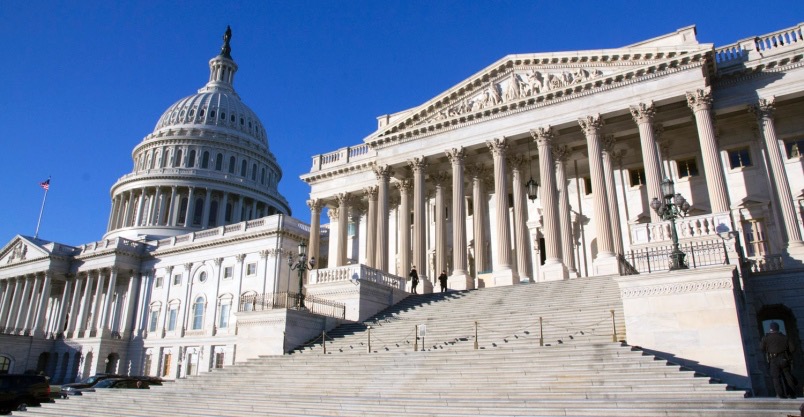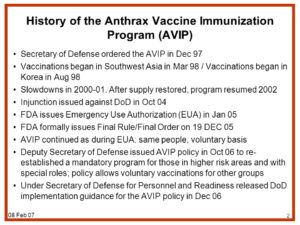
The 2018 National Defense Authorization Act contains billions of dollars and much policy concerning medical research and, of course, matters relating to nuclear, biological and chemical warfare. We don’t cover most of those medical issues except when they relate to NBC issues or raise basic military policy considerations. This is one of those cases. In this commentary, the distinguished medical ethicist and professor at the University of Pennsylvania, Jonathan Moreno, calls on Congress to scrap a provision in the 2018 NDAA concerning emergency medical exemptions from FDA oversight. Read on! The Editor.
The final draft of the National Defense Authorization Act would give the Pentagon authority to decide when unapproved drugs and devices (called somewhat vaguely “agents of war” in the proposed legislation), could be used on military personnel in an emergency. Historical experience suggests that this is a very bad idea that would create both medical and morale problems for the military and obscure the difference between medical intervention and experimentation.
This proposal should be dropped from the legislation.
 Those who support the new rules complain that they have to enter into continuing discussions with the Food and Drug Administration (FDA) while potentially useful drugs and other materials are given temporary approval. No doubt careful information gathering can be frustrating. But it is also the only way to know that something isn’t harmful and might actually help. The history of civilian and military medicine is full of examples of presumed therapies that turned out to be useless or caused harm.
Those who support the new rules complain that they have to enter into continuing discussions with the Food and Drug Administration (FDA) while potentially useful drugs and other materials are given temporary approval. No doubt careful information gathering can be frustrating. But it is also the only way to know that something isn’t harmful and might actually help. The history of civilian and military medicine is full of examples of presumed therapies that turned out to be useless or caused harm.
The FDA is the only government agency authorized to approve drugs and devices for prevention and treatment. Under the proposed rule change the Defense Department would be the first federal agency that would have a separate regulatory system, a dangerous and needless precedent for all concerned. The FDA and the DoD have long worked together to make it possible for commanders to get unapproved drugs and devices to troops. This system both allows the FDA to weigh in with its expertise on potential risks and benefits – information that commanders would surely want to have in case after using the stuff things go south – and provides a degree of “cover” to the Pentagon in case there are complaints later on. As there surely would be.
 Consider the experience with unapproved drugs in Desert Storm/Desert Shield (DS/DS). As the Pentagon was preparing for the invasion of Kuwait in 1990, it received reports that Saddam Hussein had stores of several biological and chemical agents and the ability to deliver them. The available treatments and preventions for these agents were speculative to varying degrees. For instance, the botulism toxin (BT) vaccine was considered “investigational” by the FDA. DoD petitioned the FDA commissioner for a waiver of the usual informed consent requirement, noting the therapeutic potential of the treatments against threats to the force. The FDA then adopted a rule that allowed the commissioner to drop the consent requirement in combat situations when such consent was “not feasible.”
Consider the experience with unapproved drugs in Desert Storm/Desert Shield (DS/DS). As the Pentagon was preparing for the invasion of Kuwait in 1990, it received reports that Saddam Hussein had stores of several biological and chemical agents and the ability to deliver them. The available treatments and preventions for these agents were speculative to varying degrees. For instance, the botulism toxin (BT) vaccine was considered “investigational” by the FDA. DoD petitioned the FDA commissioner for a waiver of the usual informed consent requirement, noting the therapeutic potential of the treatments against threats to the force. The FDA then adopted a rule that allowed the commissioner to drop the consent requirement in combat situations when such consent was “not feasible.”
Even this arrangement mainly stated what has already long been understood. Military medical ethicists and regulators agree that although people in uniform cannot be ordered to be in an experiment – a view that only emerged after World War II – commanders may justifiably order the use of drugs or devices that do not have demonstrated safety and efficacy if they believe that their force is under imminent threat and that their use is the best option. In turn, people in uniform will accept pretty much anything that is in the line of duty, especially if it will help them protect their brothers and sisters in arms, but they understandably resent being used as “human guinea pigs” as much as anyone else.
Problems of data collection, so crucial to gaining knowledge of drug effects, are severe enough in a carefully planned peacetime context of clinical trials. During a shooting war these problems are far greater as the confusion of combat conditions affects the way drugs are given and taken. Record keeping for the drugs that were used in Desert Storm and Desert Shield was poor even though logisticians could have helped gather information useful in future deployments. Perhaps 8,000 troops received the BT vaccine in the weeks before the invasion of Kuwait. Another 150,000 or so were vaccinated for inhalational anthrax. Tens of thousands received blister packs of a theorized antidote to nerve gas called pyridostigmine bromide (PB), used to treat myasthania gravis, a disease that progressively weakens muscles. The use of PB was voluntary but many thought it was required. The Pentagon had in fact tested PB on a few dozen personnel, not including those who might be sensitive to the drug or women, but those people were not excluded when the drug was given out.
In the months and years after the first Gulf War, veterans complained that their medical problems, often grouped under the term Gulf War Illness, were due partly to the drugs they were given. The etiology of this set of symptoms has never been fully understood but the anger can’t be questioned. Among the earliest Internet list serves were those of Gulf War veterans expressing their resentment. Over the years, I have been approached by many vets complaining about their medical conditions and the fact that records aren’t available, a concern that was echoed by a VA lawyer in a conversation I had just a few weeks ago.
Ironically, the FDA gave the Pentagon an opportunity to avoid much of the later anger by issuing their waiver on the condition that military personnel receive information about what they were being ordered or asked to take. That didn’t happen. In 1994 some members of Congress expressed their annoyance at the civilian agency for granting the waiver in the first place (though the FDA noted that it’s not expert at fighting wars), and then for not complaining to the DoD that they failed to uphold their side of the deal. So, in the end, the civilian agency got it from both ends, which actually took some heat off the Pentagon. This is a story I told in my book, Undue Risk.
Going back to the 1950s the Department of Defense has a mixed record on human experiments, but the FDA’s evolved role in drug and device approval gives our military organization a substantive argument that it takes respect for the troops seriously. It’s too bad that the Pentagon can’t take yes for an answer.
Jonathan Moreno, an expert in medical and military ethics, is the David and Lyn Silfen University Professor at the University of Pennsylvania.
Iran says it shot down Israel’s attack. Here’s what air defense systems it might have used.
Tehran has been increasingly public about its air defense capabilities, including showing off models of systems at a recent international defense expo.


























